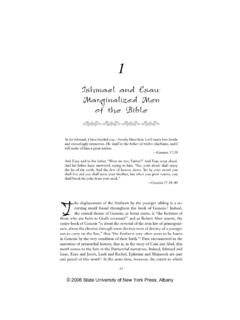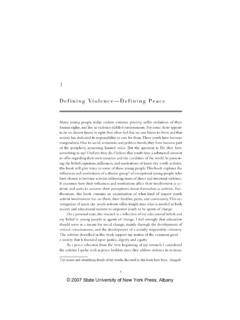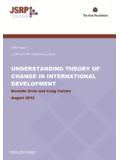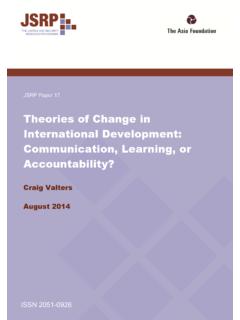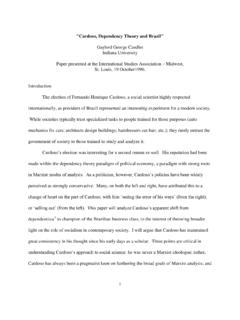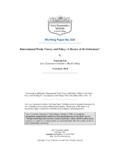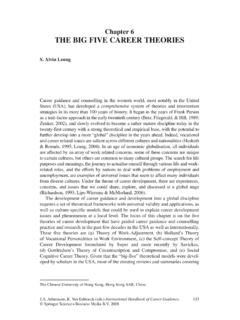Transcription of Critical Theory, Habermas, and International …
1 91 Critical theory , Habermas, and International RelationsINTRODUCTIONIn this chapter we outline elements of Critical theory and its contribution tothe study of International relations theory in the belief that a Critical theoreti-cal stance offers an appropriate framework for examining the emergence ofinternational institutions as new forms of legitimate political community. Ouremphasis in the first section is on three constituent elements of Critical theory :theoretical reflexivity, human consciousness, and normative purpose. In thesecond section, we examine the contributions of J rgen habermas to a criticalinternational theory . Indeed, his ideas about communicative rationality, delib-eration, and the public sphere have gone far to reinvigorate the Enlighten-ment project of emancipation, and the implications for International relationstheory and global institutions are substantial.
2 As we shall examine later, theseinstitutions, particularly the International regime, commonly incorporate pro-cedural norms of participation (or inclusion) and transparency (or openness).The consequence is that certain International regimes, by building democraticprocedural norms into their design and evolution, acquire the character ofincipient transnational political communities. These regimes effectively serveas public spheres whose scope for dialogic interaction amongst a wide arrayof state and nonstate actors reflect emerging global democratic practices onan unprecedented Global PoliticsCRITICAL theory AND International RELATIONSThe turn to a Critical theoretical interpretation of International relations and,specifically, International institutions, is not an argument about the failure ofneoutilitarian accounts.
3 To the contrary, neorealism and neoliberal institu-tionalism provide important insights regarding the relationship of power tointernational institutions and the role institutions, particularly regimes, havein overcoming political market failures. Both theoretical perspectives offerinsightful and helpful accounts of regime construction, maintenance and , we argue that a Critical theoretical account is useful at this point intime for two reasons. First, the contemporary global condition is such thataccounts of International politics anchored in statist forms do not accuratelycapture the diverse social forces and political challenges confronting the humanpolity. As the extensive and growing literature on the new transnationalism illustrates, a plethora of nongovernmental actors are excluded by Moreover, we embrace Andrew Linklater s argument that thecontemporary International political order has a tenuous existence and pre-carious legitimacy, because decisions are taken without considering theirlikely effects on systematically excluded groups.
4 2 Global institutions that denythe importance of nonstate actors potentially lack staying power. Second, acritical theoretical approach provides a foundation for defining alternativeemancipatory purposes for International theory . We are interested in identi-fying the changes immanent in the global order, especially the democraticideals promoted by the diverse array of nonstate actors contesting its currentdesign. The status quo version of globalization often simply replicates long-standing power relations and the discontents associated with that Thus, in the words of one scholar, globalization has too often per-petuated poverty, widened material inequalities, increased ecological degrada-tion, sustained militarism, fragmented communities, marginalized subordinatedgroups, fed intolerance and deepened crises of democracy.
5 4 Taking into account the role of nongovernmental organizations andapplying Habermasian discourse ethics to the study of International regimesilluminates their potential as the foundation for a new global order charac-terized by nonterritorial forms of political community. By dramatically ex-panding the boundaries of participation and open discussion in the contextof universally agreed normative procedures, these regimes reflect theemancipatory aims of Critical theory , approximating modes of democracyessential to constructing new identities, loyalties, and obligations inherent ina global political community. Burgeoning International norms promotinggreater inclusion and openness in various International regimes greatly dimin-ish the likelihood that the coercive strength of materially powerful actors will11 Critical theory , habermas , and International Relationscarry any given point, and substantially increase the prospects for compellingarguments to find consensual opportunity for building community is found in the immanentcontradictions of the current political order.
6 The contemporary human con-dition is characterized by rapidity, intensity, and extensity on an historic transformations are revolutionizing means of communicationand production, resulting in flows of money, knowledge, and informationaround the globe at unprecedented rates of speed. The carrying capacity ofcommunication networks is increasing such that the volume of flows is uniquein historical time while the extensiveness of networks has left no part of theglobe The consequence for advocates of a hyperglobalist viewof globalization is profound political, social, and economic Patternsof International economic exchange are undermining the authority of statesoverwhelmed by the quantum leap in transnational interactions that, by virtueof their scale, demonstrate the decline of unilateral and absolute territorialgovernance.
7 By contrast, for transformationalists, it is not the decline of thestate per se, but a fundamental reconfiguration of sovereignty and authoritythat is of More than simply integration and interdependence pro-ceeding apace, the structures and centers of authority are shifting even asidentities become redefined. This long-term secular trend is accelerated withnetworks of communication and advances in technology that, in effect, em-power emerging societal actors, whether they be transnational corporations,NGOs, social movements, or other elements of a global civil either case, these profound changes are taking place within a trans-formed geopolitical context that heightens the salience of new issues on theone hand, and the consciousness of social actors on the other, signaling aunique era in global In the first instance.
8 The end of the Cold Warhas increased the visibility of numerous issues on the global political agendathat were historically characterized as low politics. Economics, certainly, butalso human rights, the environment, development, and the growing gap be-tween rich and poor are central themes of contemporary world politics. Theseare issues whose resolution challenges directly the politics of self-interest andparticularism. The shared burdens of responsibility, the shared consequencesof neglect, and the implied crisis of human experience, all suggest that thetransformation brought about by globalization and the changed nature ofworld politics necessitates a new global agenda anchored in new conceptionsof obligation, loyalty, and responsibility.
9 To draw on Mark Neufeld s discus-sion, there is a recognition in popular and scholarly political discourse thatthe polis, a socially created political space intended to foster the conditionsnecessary for the leading of a good and just life, a life encompassing thevalues of equality and freedom requires Whereas the territorial12 Democratizing Global Politicsstate once represented the polis as coterminous with the minimum self-sufficient human reality, the scale and pace of new challenges to humanity call out for the reidentification of the idea of the polis with the planet as awhole: a truly global polis. 10 Such a redefinition of a polis emerges only with a new mode of as the changed geopolitical context gave way to alternative issue hierar-chies, that context has also opened up political space for a greater number ofactors.
10 Nongovernmental organizations and intergovernmental agencies havebecome integral figures in world politics. Global social movements are takingadvantage of unprecedented technological developments to strengthen theircapacities for mobilization, organization, and articulation of Oneconsequence is that the interconnectedness of issues is increasingly made appar-ent through the activities of transnational issue networks seeking to constructnew International norms and other institutions of global Loosen-ing the historic social bond between state and citizen challenges claims lodgedby the sovereign state to the sole possession of political authority and sum, new global social movements and transnational issue networks arereflections of the relative shift of capacities for political action and mobilizationhistorically contained within the state.



